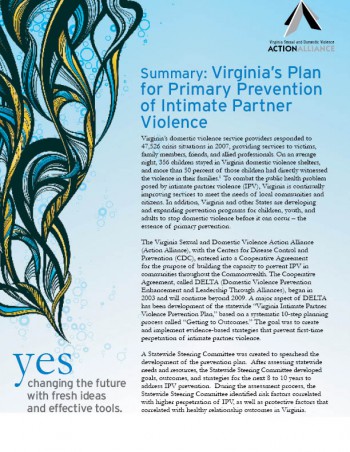Resources Library: Community Coordination & Collaboration
Start a Search:
Strategic Planning Resources for Coordinated Community Response Teams
Published by Supreme Court of Virginia, Office of Executive Secretary April 2009.
Summary: Virginia’s Plan for Primary Prevention of Intimate Partner Violence

The Virginia Sexual and Domestic Violence Action Alliance (Action Alliance), with the Centers for Disease Control and Prevention (CDC), entered into a Cooperative Agreement for the purpose of building capacity to prevent IPV in communities throughout the Commonwealth. The Cooperative Agreement, called DELTA (Domestic Violence Prevention Enhancement and Leadership Through Alliances), began in 2003 and continues today.
A major aspect of DELTA has been development of the statewide “Virginia Intimate Partner Violence Prevention Plan,” based on a systematic 10-step planning process called “Getting to Outcomes.” The goal was to create and implement evidence-based strategies that prevent first-time perpetration of intimate partner violence. This document summarizes the 5 goals developed during the planning process.
Published by Virginia Sexual & Domestic Violence Action Alliance. 2009.
4 pages.
Supporting Multilingual and Bicultural Rural Advocates
Rural dual/multi-service advocacy programs that are able to provide culturally and linguistically appropriate services to sexual violence survivors make services for all rural survivors more inclusive and accessible. Multilingual and bicultural advocates are an important part of rural agencies being able to provide these culturally and linguistically appropriate services. A multilingual advocate is someone who can understand and speak more than one language. Often, multilingual advocates are bicultural as well. A bicultural advocate is someone who balances the cultural attitudes and customs of two countries or ethnic groups, usually someone who has moved to the United States from another country or someone whose parents moved to the United States from another country. Advocacy programs often struggle to find, hire, and retain multilingual and bicultural rural advocates. This is why it is important to understand who these advocates are, where they come from, and how we can create a supportive work environment for them. This paper is intended for rural dual/multi-service agencies looking for suggestions on how they can support multilingual and bicultural rural advocates.
Ten Years and Counting: The Persistence of Lethal Domestic Violence in Virginia
Final Report on domestic violence fatality review with recommendations from The Fatal Domestic Violence Workgroup.
Published: December, 2010
This report is a product of Virginia Department of Health's Office of the Chief Medical Examiner's Domestic Violence Fatality Review Project. For more information, visit: http://www.vdh.state.va.us/medexam/dvfr/index.htm#Intro
The Virginia Partnership for Community Defined Solutions Contact List
This contact list provides the current names and contact information of participating partners in the Virginia Community Defined Solutions partnership grant.

